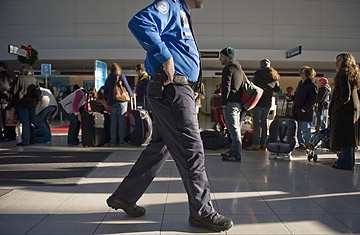
A Transportation Security Administration official walks past passengers at Baltimore Washington International Airport
In the aftermath of the Christmas airline-bombing attempt, U.S. officials are anxiously trying to figure out what went wrong: Why was there a breakdown in communication among intelligence services that allowed the suspected attacker, Umar Farouk Abdulmutallab, to slip through the cracks? Were clues missed somewhere along the way?
On Tuesday, an austere President Barack Obama told the nation that he had ordered his security teams to flesh out the systemic failures that allowed Abdulmutallab to board the plane to the U.S. with explosives allegedly sewn into his underwear. But intelligence gathering, in this case, didn't seem to be the problem. In fact, that system functioned exactly as it was meant to — indeed, perhaps too well. It's clear now that there were multiple signs in recent months that Abdulmutallab was a potential risk, but they were simply lost in the unmanageable flood of information the U.S. intelligence and security agencies are designed to produce. Obama himself nodded toward this problem after meeting with security officials this week.
"This was not a failure to collect intelligence, [but] a failure to integrate and understand the intelligence that we already had," Obama said on Tuesday after scolding U.S. officials over the case, which he called a "screwup that could have been disastrous." "I will accept that intelligence by its nature is imperfect, but it is increasingly clear that intelligence was not fully analyzed or fully leveraged. That's not acceptable."
Perhaps not, but security experts in Europe — sympathetic to the task their American peers face — say that it may be understandable. One of the reasons U.S. authorities may have missed clues or not properly examined them in the Abdulmutallab case is that they are forced to sort through a massive tide of intelligence on a daily basis, two experts tell TIME. They note that the warnings about Abdulmutallab came from varying sources — including CIA intercepts in Yemen and the U.S. embassy in Nigeria — and were sent to different U.S. security organizations. Connecting the dots becomes more difficult when multiple streams of intelligence empty into several different lakes, the experts say.
"About the time we're overcome with envy and awe at the reach and depth of American intelligence-gathering capacity, we start to feel really lucky at not having to process the impossible mass of information it generates," says a French counterterrorism official. "In this case, too much intelligence didn't corrupt the intelligence, but the abundance of information did make it harder to put it all together correctly."
The other expert, who asked to be identified only as a European intelligence official, understands the U.S. consternation over the failure to identify Abdulmutallab before he boarded Northwest Flight 253 from Amsterdam to Detroit. After all, the official says, an August CIA intercept of a phone conversation in Yemen caught extremists speaking of a Nigerian preparing a strike. And more recently, Abdulmutallab's own father alerted the U.S. embassy in Abuja, Nigeria, of his concerns that his son's radicalization made him a security threat. Even as Abdulmutallab allegedly put his plot into motion, the official says, details of his movements should have set off alarm bells in various places. Abdulmutallab had recently been to a notorious al-Qaeda hot spot, Yemen, and he bought a one-way ticket to the U.S. with cash and traveled without any luggage.
"These are all the kinds of very basic, human-level details security people have looked for since Islamist terrorism rose as a threat," the European official explains. "But these are also basic details that can now get overlooked as surveillance becomes more technical and computerized and people wait for a warning beep to sound. Yes, Abdulmutallab should have been entered into U.S. systems, but even without that, someone somewhere should have seen these other details and checked them out."
Despite the failure to do just that, officials say the Abdulmutallab case is the exception to the rule. The European security experts stress that international cooperation and intelligence sharing to fight terrorism have never been better. Both officials downplayed the tit for tat between London and Washington earlier this week over comments from British authorities that the domestic spy agency MI5 had given U.S. authorities early intelligence on Abdulmutallab. (It hadn't, because British authorities found no evidence that the Nigerian had been radicalized while studying in London from 2005 to 2008 and thus had no reason to sound alarm bells.)
Why? Because insignificant or wrong information can gum up the works, as extremists have unfortunately discovered. "If there's one thing we've learned, it's that al-Qaeda just loves giving false information and bogus clues to send authorities on wild-goose chases," the French official says. "You share what you have, but you're always wondering, 'Is this solid, or will this just become a distraction to someone?'"
Given al-Qaeda's love of head fakes, the official wonders what percentage of the 550,000 names on the U.S. terrorism watch list might be decoys intended to jam American databases and allow more furtive or budding extremists to get lost in the mass of information. But even if there is a high number of errant names on such lists, he acknowledges, they are a necessary evil — for now. Although the U.S. intelligence systems are imperfect and occasionally get swamped, casting as wide a net as possible is still the best hope for identifying the largest number of would-be terrorists — and could-bes as well.
